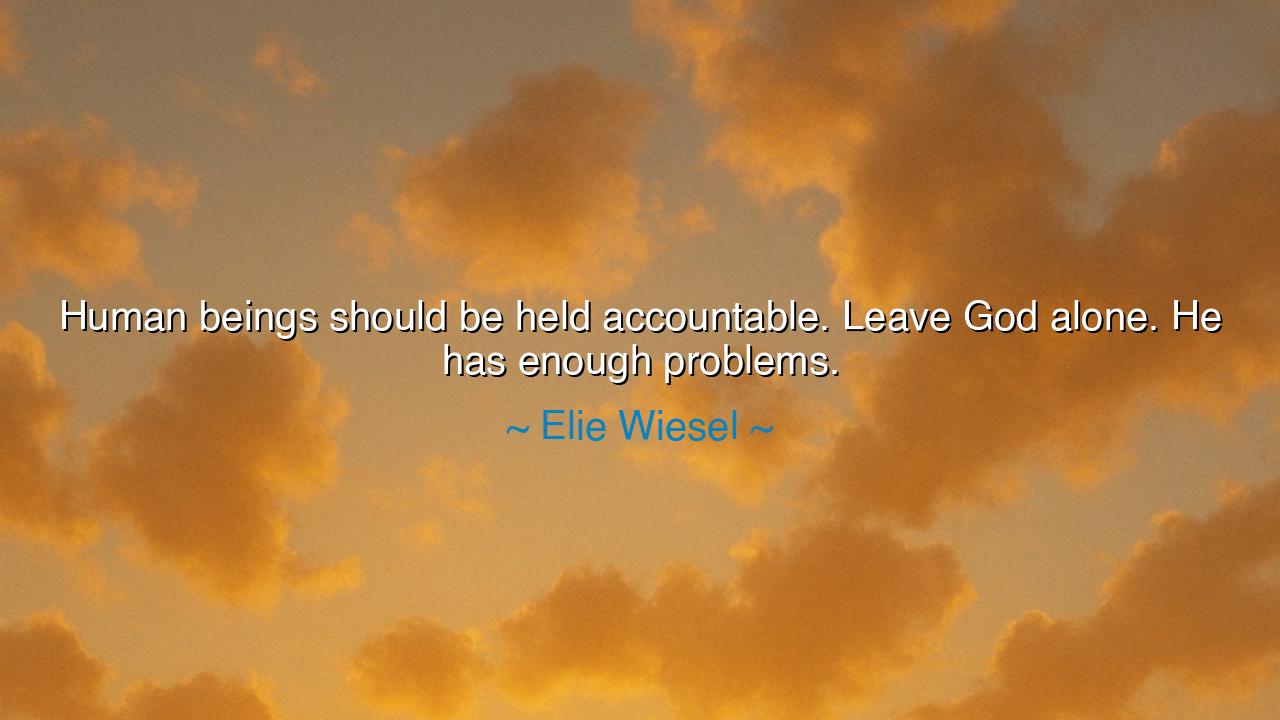
Human beings should be held accountable. Leave God alone. He has






In the piercing and sorrowful words of Elie Wiesel, survivor of the Holocaust and witness to humanity’s darkest abyss, we find this profound admonition: “Human beings should be held accountable. Leave God alone. He has enough problems.” These words, though simple in form, carry the weight of centuries of suffering and moral reflection. They emerge not from the cold intellect of philosophy, but from the fiery heart of one who saw evil face to face. Wiesel, who walked among the ashes of Auschwitz and lived to tell the tale, speaks here as both accuser and teacher. His words are not meant to wound faith, but to awaken responsibility—to remind humankind that the horrors of the world are not wrought by heaven’s hand, but by our own.
Elie Wiesel was a man who spent his life wrestling with both God and man. As a child, he had prayed with fervor, believing the world to be sustained by divine justice. But in the concentration camps, where he saw the innocent perish and the righteous destroyed, his faith was shattered and remade. In his memoir Night, he wrote of watching a young boy die upon the gallows, and someone near him whispering, “Where is God now?” Wiesel’s heart answered, “He is here—hanging on this gallows.” From that moment forward, he did not abandon God, but he ceased to defend Him. His battle was no longer to justify heaven, but to hold humanity accountable for the hell it creates. Thus, when he said, “Leave God alone. He has enough problems,” he spoke as one who had learned that the true measure of morality lies not in blaming the divine, but in confronting our own complicity.
This quote, born of anguish, carries within it a profound reversal of responsibility. For millennia, mankind has cried out to God for the injustices of the world: Why do the innocent suffer? Why does evil prevail? But Wiesel, with the clarity of one who has endured the unendurable, turns that question back upon us. Why do we allow it? He reminds us that the atrocities of history—genocide, war, slavery, oppression—are not acts of divine will, but of human hands. The camps were not built by angels, but by engineers; the executions were not decreed by heaven, but by men with pens and uniforms. When we ask God to explain the world’s cruelty, we avoid the mirror. Wiesel’s plea is simple yet searing: stop blaming God, and start owning the weight of your choices.
History bears tragic witness to the truth of his words. Consider the Rwandan genocide of 1994, when nearly a million souls were slaughtered in a matter of months while the world stood by in silence. The cries of the dying rose to heaven, yet heaven did not answer—not because God had turned away, but because humanity had closed its ears. The nations of the earth, bound by treaties and moral vows, debated and delayed while men with machetes tore their neighbors apart. And when the killing fields lay silent, many asked again, “Where was God?” Wiesel’s words are the answer: God was not absent; we were. The blood was on human hands, and it is humanity, not God, that must answer for such crimes.
Wiesel’s insight carries not only accusation but a call to moral awakening. He does not ask us to abandon faith, but to purify it. To believe in God, he suggests, is not to wait for divine intervention, but to act as partners in creation, to bear responsibility for the world we inhabit. If God has “enough problems,” it is because His children have failed to live as stewards of justice and compassion. The divine cry of Genesis—“Where are you?”—still echoes through history, not as a question of location, but of accountability. Wiesel reminds us that true faith is not resignation, but responsibility—not the hope that God will save us, but the courage to save each other.
In this light, his statement becomes both a rebuke and a revelation. It rebukes the laziness of those who use faith as escape, who say, “It is God’s will,” while doing nothing to confront evil. It reveals, too, the nobility of human freedom—that we are not helpless creatures tossed upon the tides of fate, but moral agents capable of choosing good over evil, justice over apathy. To “leave God alone,” in Wiesel’s sense, is not to abandon Him, but to honor Him by taking up our share of His burden. It is to act as the hands of compassion, the voice of conscience, the light in the darkness.
The lesson, then, is as urgent today as it was in Wiesel’s time: do not seek excuses in heaven for the wrongs of earth. When you witness cruelty, confront it. When you see injustice, oppose it. When you hear silence, speak. To live righteously is to refuse the comfort of blame and embrace the discomfort of duty. Humanity’s greatest sin is not always its violence, but its indifference—the choice to do nothing while others suffer. Wiesel’s life, his pain, and his words all cry out: take responsibility for the world you have made, and in doing so, lighten the sorrow of God Himself.
So remember this, O children of conscience: faith without action is hollow, and prayer without compassion is noise. Elie Wiesel, who walked through the valley of death and still spoke of hope, teaches us that the true worship of God lies in the service of man. Leave God to His mysteries, and turn your heart toward the living. For if God indeed has “enough problems,” it is not because He abandoned us—it is because we, too often, have abandoned each other.






AAdministratorAdministrator
Welcome, honored guests. Please leave a comment, we will respond soon